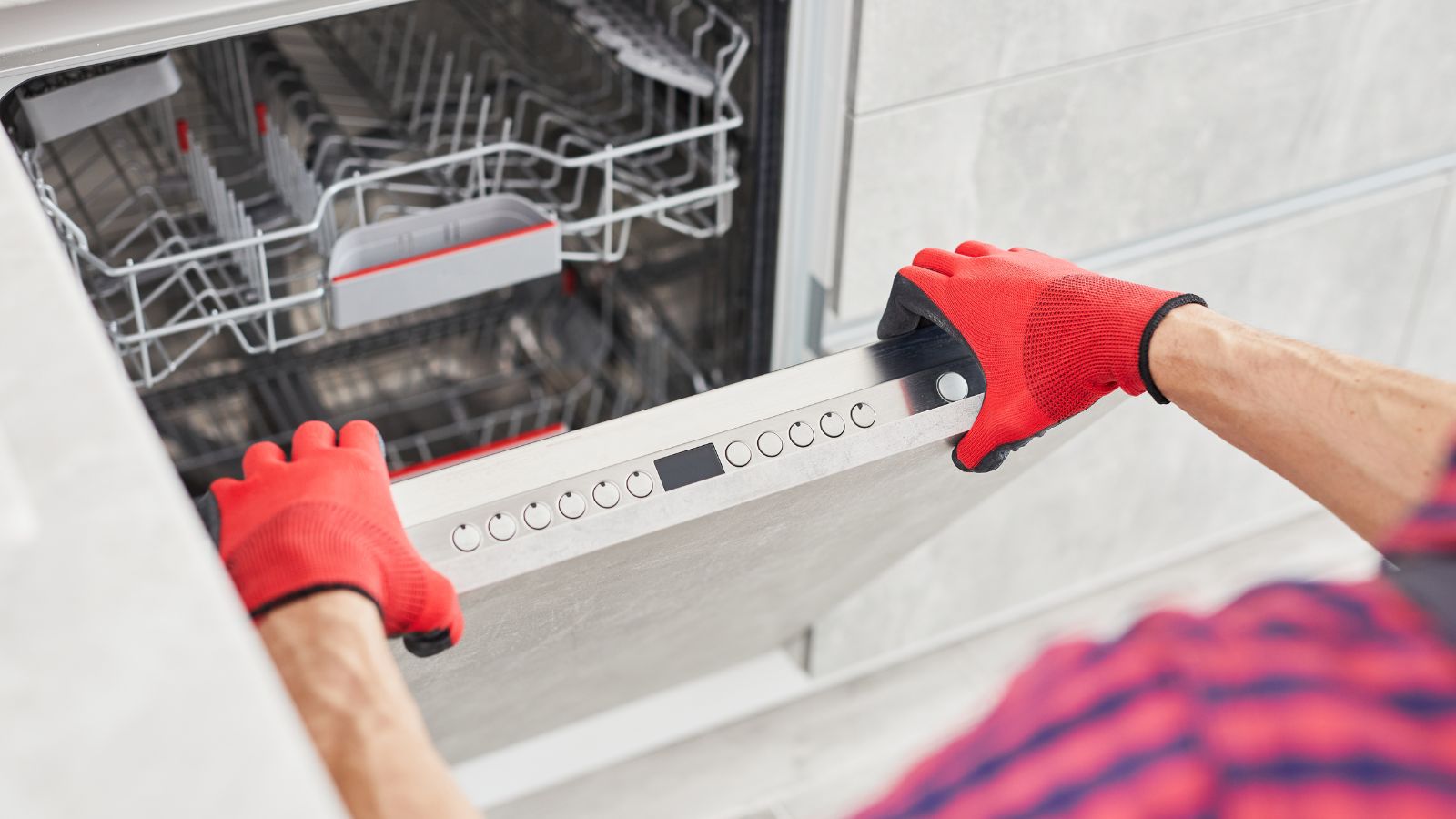Experiencing a wet dog smell emanating from your dishwasher can be both unexpected and unpleasant.
It’s a common issue that many homeowners face, usually caused by the buildup of food particles and bacteria that can develop into mold and mildew over time.
You might notice this particularly pungent odor after running a cycle, which can transfer to your dishes, defeating the purpose of using your dishwasher to clean and sanitize.
Tackling the wet dog smell begins with understanding how your dishwasher operates and the importance of regular maintenance.
By maintaining cleanliness and ensuring the dishwasher is functioning correctly, you can prevent odors before they start. However, if the smell has already taken hold, there are several techniques you can employ to eradicate it.
These include deep cleaning methods and utilizing household items that are likely already in your cabinets.
Combatting this issue does not require harsh chemicals or expensive solutions. Simple, routine practices and natural cleaners can make a significant difference.
From vinegar to baking soda, these readily available products can not only remove the underlying causes of the smell but also leave your dishwasher smelling fresh.
It’s surprising how a few small changes in the way you use and care for your dishwasher can result in a cleaner, odor-free appliance.
1. Identifying the Sources of Wet Dog Smell
When your dishwasher starts to emit a wet dog smell, it’s often due to trapped food particles or grease. Regular maintenance is key to addressing these issues.
Check Filters and Sprayer Arms
Filters: Your dishwasher’s filter traps food particles. If not cleaned regularly, these particles can cause a foul odor. Ensure the filter is routinely cleaned as per the manufacturer’s instructions.
- How to Check: Locate your dishwasher’s filter, typically at the bottom of the machine. Remove it according to your user manual and rinse under running water.
Sprayer Arms: These can get clogged with debris, preventing a thorough clean and potentially contributing to the smell.
- How to Inspect: Look for the rotating arms inside your dishwasher. Check for clogged holes and clear out any obstructions with a toothpick or small brush.
Inspect the Door Seal
Door Seal: Food particles and grime can get lodged in the door seal, causing an odor over time.
- Cleaning Process: Wipe down the door seal with a damp cloth regularly to prevent buildup. If the seal is damaged, consider replacing it to maintain dishwasher efficiency and hygiene.
Examine Drain and Hoses
Drain: A clogged drain is a common culprit for dishwasher odors.
- How to Clean: Ensure that the drain area is free from large food particles and debris. Check the drain filter and clean as necessary.
Hoses: They can harbor mold or mildew, leading to unpleasant smells.
- Inspection Tips: Check for kinks or blockages in the drain hose, and ensure it is properly attached to prevent leaks and stagnation. If you suspect mold, consider replacing the hose.
2. Regular Maintenance Routines
Keeping your dishwasher free of the wet dog smell is straightforward with regular maintenance. Paying attention to a few key components can ensure fresh, clean-smelling dishwashing cycles.
Clean the Filter
First, remove and clean the filter. Located at the bottom of the dishwasher, this is where food particles can get trapped and start to smell.
Rinse it under hot water and gently scrub with a soft brush to remove debris. If it’s particularly dirty, soaking it in a solution of warm water and a little dishwasher cleaner can work wonders.
Clean the Spray Arms
Next, check the spray arms for clogs. Tiny bits of food or mineral deposits from water can block the holes, preventing proper water flow.
Clear any blockages with a toothpick or small wire. Then, wash the arms under running water to remove any remaining residue.
Clean the Door Seal
The rubber seal around the door is a hotspot for mold and mildew. Wipe it down with a cloth dampened with warm, soapy water, inspecting for any signs of wear.
If you notice persistent mold, applying a small amount of bleach (diluted with water) to a cloth can help remove it. Always remember to rinse the seal after using any cleaning solution.
Deodorize with Vinegar and Baking Soda
Finally, to deodorize the dishwasher and remove lingering smells, use vinegar and baking soda. Start a cleaning cycle with the dishwasher empty, pouring a cup of white vinegar into the bottom.
After the cycle has run for a few minutes, pause it to let the vinegar soak for 20 minutes. Then resume to complete the cycle.
Afterward, sprinkle a cup of baking soda across the bottom of the dishwasher and run a short cycle to leave it smelling fresh.
Regularly using this natural cleaning method will help keep your dishwasher clean and odor-free.
3. Deep Cleaning Strategies
For a fresh-smelling dishwasher free from the wet dog odor, targeting mold and grease through deep cleaning is essential.
Bearing safety in mind, let’s tackle this using some effective cleaners and proven techniques.
Use Bleach Carefully
When using bleach, safety comes first. Always ensure your dishwasher is bleach-friendly, which typically means it must have a stainless-steel interior. To address mold and greasy residues:
- Remove all dishes and dishwasher-safe parts.
- Create a solution of 1 cup of bleach mixed with a gallon of warm water.
- Wear gloves and use a sponge to apply the solution to the interior surfaces, avoiding any metal parts.
Make sure your kitchen is well-ventilated during this process, as bleach can be a strong chemical.
Apply Dishwasher Cleaners
Dishwasher cleaners are specially designed for deep cleaning without the harshness of bleach. They’re easy to use and safe for all dishwasher models.
Here’s how to apply them effectively:
- Choose a high-quality dishwasher cleaner that targets mold and grease.
- Follow the manufacturer’s instructions for placement, typically in the detergent tray or directly in the bottom of the dishwasher.
- Run a hot water cycle to activate the cleaner and reach every corner.
Remember, while vinegar is a common cleaning agent, it’s not always the best choice for deep cleaning tasks, as its efficacy against tough grease and mold isn’t as high as commercial dishwasher cleaners.
4. Prevention Tips
Maintaining a clean dishwasher free of the wet dog smell begins with proactive steps focused on water quality and the way you load your dishwasher.
Improve Water Quality
You might not realize it, but the water quality in your dishwasher plays a crucial role in preventing foul odors. Hard water can lead to mineral deposits that contribute to unpleasant smells.
- Use a Water Softener: If you have hard water, consider installing a water softener. This device will remove minerals from the water, reducing the chance of deposits and smells.
- Select the Right Detergent: Make sure to use a detergent that’s designed for hard water. Bleach-based detergents can be particularly effective in these conditions, helping to maintain cleanliness and hygiene.
Ensure Proper Dishwasher Loading
How you load your dishwasher can impact both the cleanliness of your dishes and the scent of your machine.
- Avoid Overloading: Ensure adequate water flow and detergent access by not overloading the dishwasher. This prevents food particles from remaining on dishes, which can lead to odors.
- Strategic Placement: Place items with a larger surface area at the bottom and towards the center, and avoid stacking dishes.
- Separate Different Material Types: Keep plastics, metals, and ceramics separate to ensure they get cleaned properly without trapping water or food that emits odors.
By focusing on water quality and your dishwasher’s loading technique, you can effectively prevent the wet dog smell and keep your dishwasher fresh and clean.



